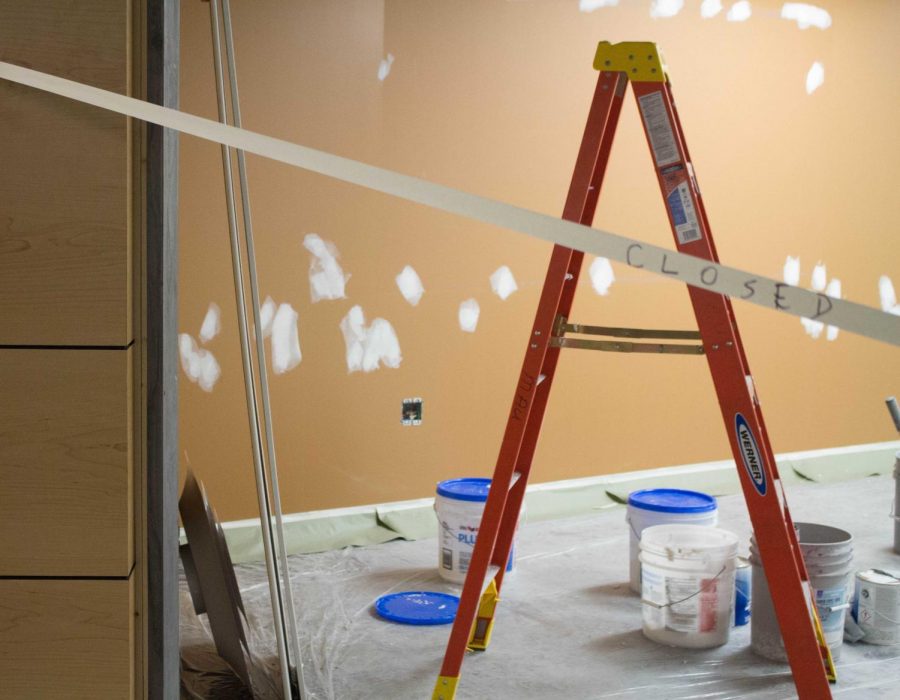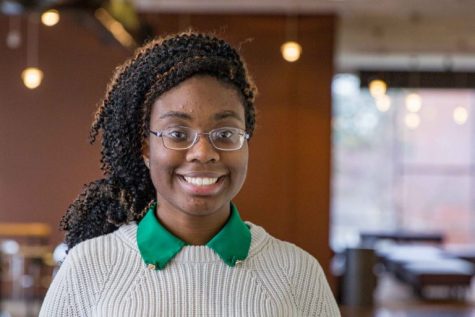Food insecurity leads to new pantry
Vice President of Student Affairs Paula Knudson said that the plan is to have the food pantry openable in January, but some options in December.
Dec 3, 2018
Students who use the basement of Maucker Union for the study space or computer lab may notice recent changes.
The university is working on installing a food and essentials pantry to help students who struggle with food insecurities.
The pantry’s soft opening is tentatively scheduled for next month, but the project has been in the works since last fall.
“I started going around campus talking to a lot of people, doing a lot of active listening,” said Vice President for Student Affairs Paula Knudson. “What I learned is, we had a lot of departments, a lot of people, staff members or faculty, around campus that were bringing in food to their offices or departments just for students because they were seeing some students not having enough to eat. So, we had all these little pockets around campus.”
Although the Lutheran Student Center does have a food pantry, Knudson discovered that not every student felt comfortable going to religious organization for assistance, and because the Northeast Iowa Food Bank is in Waterloo, it’s not an option for students who don’t have reliable transportation. UNI has partnered with Northeast Iowa Food Bank to create the food pantry.
Survey Sent
Knudson assembled a task force to address the problem.
One of the first things they did was survey the students. Out of the 1,500 survey respondents, the task force discovered that 16 percent of them were food insecure. The number was even higher among minorities and those who come from a lower socioeconomic background. In addition to that, 80 percent of survey respondents said they knew someone who struggled with food insecurity and wanted to help them.
“Quite honestly, when we got those results, the task force suggested that we do an oversight committee to figure out how to operate [a food pantry],” Knudson said. “We decided instead [to] just get it up and running. The need is there. We know it. We’ll figure some of this out. Let’s get something open. We just made a decision to move it forward.”
The task force identified places on campus that would be effective for the food pantry. Maucker Union was chosen largely because it’s easily accessible to many students. Knudson admits that there are pros and cons to the location. Although it’s central to life on campus, students who need the assistance of a food pantry may want more privacy than what the Union provides.
Donations Accepted
Although the pantry has not opened yet, food donations are already being accepted. The Noehren Haunted House collected several hundred pounds of canned goods. There are also donation boxes around campus where people can donate canned and dry goods as well as essentials like tooth paste and laundry detergent.
Nonperishable food items are being accepted through Dec. 7 at 23rd St Market, Biscotti’s, the Book Bistro, Chats, Essentials, the Maucker Union Food Court and Schindigs.
Some of the items collected will go into backpacks for students who have to stay on campus over winter break.
“We don’t want our students to go hungry,” Knudson said.
In addition to these items, the installation of the pantry itself will cost about $20,000, according to Knudson. The main way that these funds are being raised is through PAWPrint, a crowdfunding platform exclusively for UNI.
Student Involvement
The marketing efforts ahead of launching the fundraiser weren’t only by UNI staff. A group of leadership students assisted in the marketing as a project for one of their leadership classes. While many of the students in the class chose to help the YMCA or the Boys’ and Girls’ Club, one group of students desired to do something less mainstream. When they heard about the food pantry, they immediately wanted to help.
“It’s something that even when the class is over and even when we graduate, it’s still something that’s going to be going on,” said Reis Rausch, a senior supply chain management major with an organizational leadership minor, who was one of the students to help the food pantry. “What was cool to us was even when we’re all done, when we don’t have our hands in it anymore, it’s still going to be helping people out.”
The students helped by leading a can drive with local businesses and raising awareness. For instance, they sent emails to faculty members, urging them to donate.
Although Rausch was aware that food insecurity was a problem, he didn’t realize just how prevalent it was among UNI students until he got involved with the project.
“I just want people to know about it,” Rausch said. “There are kids that are skipping meals and doing all of this. How can you function fully as a student and get good grades and do all this stuff if you can’t even afford to get food? I just wanted to raise awareness through campus, so kids know that this stuff is out there if they need it.”
Rausch hopes to continue help with the food pantry until he graduates in May, even after the leadership project concludes.
Fundraising Efforts
Originally before launching their crowdfunding, the goal was $4,000. An anonymous donor agreed to match that goal with $2,000 for a total of $6,000. They met their goal within 24 hours of launching on Giving Tuesday (Nov. 27). They are now aiming to meet a stretch goal of $10,000.
“We’ve seen a lot of faculty and staff support the project and that doesn’t surprise me,” said Kyle Soldwich, who is the associate director of annual giving programs. “From the task force to talking to Paula — there’s a lot of people who are really passionate about this issue and getting the food pantry launched.”
Soldwich said that there will be some additional marketing pushes in the final days of the campaign.
Although there are still some questions about how it will operate, Knudson knows they want the pantry to be exclusively for students. Because the original survey also found that students are more receptive to their peers helping them, Knudson hopes the pantry can also be run by students. Ashley Adams, campus programs coordinator at Student Life and Event Services, is currently trying to identify a group of students who would be up to this task.
When the pantry has its soft opening in January, it will be heavily reliant upon food and essentials donations. Knudson hopes the pantry will be fully operational in the fall of 2019.
“We hope to have refrigeration, which might require some purchasing,” Knudson said. “And the less purchasing we have to do in food, the more we can invest in marketing and the supplemental things.”
Monetary donations will still be accepted through Tuesday, Dec. 4 at pawprint.uni.edu/food pantry.









